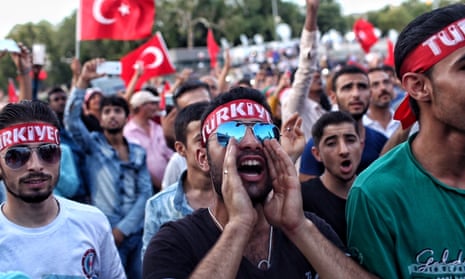Last week, President Recep Erdoğan of Turkey declared a national mobilisation. The last time a similar announcement was made was during the second world war. Turkey is already in a state of emergency following the bloody coup attempt in July that left more than 200 dead. That coup by a cabal in the army loyal to reclusive religious leader Fethullah Gülen was shocking, and it no doubt made everything worse. Turkey has gone through three military takeovers – each with a worse record of human rights violations than the last.
Thus the country’s liberals and democrats were among the first to oppose the putschists this summer; it is one of Turkey’s endless ironies that the same liberals and democrats would also be the first to be silenced in the ensuing purge by the government.
Erdoğan’s AKP (Justice and Development party) has increasingly sharpened the crackdown on its critics, starting with journalists, writers, editors, cartoonists and intellectuals. Today, the country is the world’s leading jailer of journalists, surpassing even China. Another target of the government clampdown has been the HDP, the Kurdish opposition party. Its co-leaders, including the charismatic Selahattin Demirtaş, are imprisoned, and all hopes for a Turkish-Kurdish reconciliation are sadly crushed.
Now, as the new year approaches, hundreds of people in major Turkish cities are queueing up to purchase national lottery tickets. This year the jackpot is a whopping 60m Turkish lira (about £14m) – though the currency has plummeted to a record low and the third-quarter GDP has shrunk for the first time since 2009. The fragile economy was further weakened when the European parliament voted last month in favour of freezing membership talks with Turkey. But despite the economic hardships and political uncertainties, the national lottery remains as popular as ever in my motherland. As the old proverb goes, “Hope is the bread of the poor.”
The lottery is not merely a financial concept for us Turks. It is almost existential. There is a widespread feeling that life is a game of chance – and so is death. Since the summer of 2015, there have been 33 terrorist blasts across the country, killing 460 people and wounding more than 2,000. The last in the series of horrific attacks occurred in Kayseri, an industrial hub in central Anatolia. A suicide car bomb destroyed a public bus carrying civilians and off-duty soldiers. Thirteen people died. On Monday, in a shocking, cold-blooded assassination, the Russian ambassador to Turkey was shot dead in a gallery in Ankara. A week before, there were twin terror attacks near Beşiktaş football stadium, on the shores of the Bosphorus, in Istanbul.
Those attacks, by Tak, which is an offshoot of the outlawed terrorist organisation PKK (Kurdistan Workers’ party), murdered 44 people. For days, all over social media Istanbulites shared stories of close calls, of how they had passed by the site of tragedy merely a few minutes or seconds ago, surviving by pure coincidence.
Seeing life and death as a lottery exacerbates the culture of fatalism, which is already deeply rooted in too many Islamic countries. After 12 female students were burned to death in a dormitory in Adana, several members of the establishment, including a leading scholar on TV, called the tragedy “an act of fate” (kader). Little did they dwell on the fact that the girls had died because the fire escape door had been locked to make sure they would not slip out at night.
As the lottery of death continues, there is a new concept in vogue in Turkey: martyrdom. The ministry of religion, Diyanet, published in a magazine aimed at children a series of comic strips glorifying martyrs. Following the terror attacks in Beşiktaş, Mehmet Özhaseki, the minister of environment and urbanisation, told police officers: “Each of us is a candidate for martyrdom. If Allah permits, I’d be a martyr; you, too, shall be martyrs, God willing!”
Such jingoistic rhetoric is especially painful and adds insult to injury for the families of the victims. The father of a 19-year-old medical student killed at the blast protested: “I don’t want my son to be a martyr – my son was massacred.”
The rise of four Ms in Turkey – militarisation, misogyny, mobilisation and martyrisation – is not good news for Turkey’s liberals, democrats and secularists, who already feel depressed, forsaken, abandoned. It cannot be a good omen for the region, either.

Comments (…)
Sign in or create your Guardian account to join the discussion